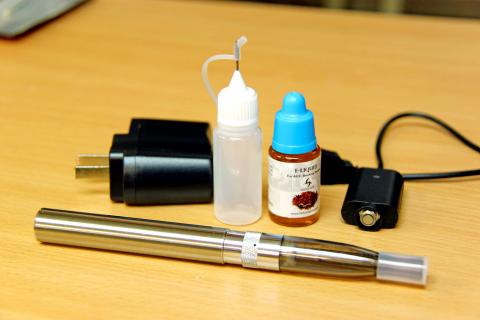A number of anti-smoking advocates yesterday urged the government to regulate electronic cigarettes as a tobacco product rather than a controlled drug to address rampant illegal sales of the device.
The call came one day after the WHO report called for tighter regulation of e-cigarettes, including their use in public places and outlawing tactics to lure young users.
“Electronic cigarettes are a type of cigarette, but some manufacturers market the devices as a healthier alternative to conventional tobacco, which has misled young people into thinking that it is okay to use the product,” Lin Ching-li (林清麗), director of the John Tung Foundation, the nation’s most prominent anti-smoking group, said in a telephone interview.

Photo: EPA
The government categorizes e-cigarettes containing nicotine as a regulated drug subject to the Pharmaceutical Affairs Act (藥事法). Due to the stringent requirements for getting a permit to manufacture or sell a drug, no e-cigarettes can be sold in Taiwan.
However, the act only targets manufacturers, importers and sellers of the device, not consumers. The illegal manufacture, import or sale of e-cigarettes is punishable by a maximum prison term of 10 years and a fine not exceeding NT$10 million (US$330,000).
Nicotine-free e-cigarettes are covered by the Tobacco Hazards Prevention Act (菸害防制法), which prohibits the unlicensed manufacture, import and sale of any “candies, snacks, toys or any other object shaped like cigarettes.” Violators could face fines ranging from NT$10,000 to NT$50,000.
Lin said categorizing e-cigarettes as a regulated drug has only prevented them from entering the country legally, because people can still purchase them online, on the street or in night markets.
Foundation chief executive officer Yao Shi-yuan (姚思遠) said the group has received 939 complaints about illegal e-cigarettes over the past five years and he urged the government to stop turning a blind eye to the problem.
“Products that contain nicotine that are not designed for medical purposes should be regulated under the same law as tobacco products. That is the only way to prevent people from selling e-cigarettes, marketing them online, or using them indoors or in public places,” Yao said.
Since the manufacturers would also be required to comply with the packaging and labeling regulations covering conventional cigarettes, people would stop thinking that e-cigarettes are safe to use, he said.
Consumers’ Foundation chairman Mark Chang (張智剛) said categorizing e-cigarettes as a tobacco product is the only way to address the problem.
Wu Ming-mei (吳明美), section head of the Food and Drug Administration’s Northern Center, said the listing of e-cigarettes as a regulated drug in 2009 was meant to prevent them from entering the country.
According to the New York Times, the WHO report expressed “grave concern” about the growing role of the tobacco industry in the e-cigarette market and said the devices should be banned from indoor use “until exhaled vapor is proven to be not harmful to bystanders.”
The report also called for regulation to ensure the products contain a standard dose of nicotine, bans on sales to minors and that fruity, candy-type flavorings be prohibited, the Times said.
Additional reporting by staff writer

‘DENIAL DEFENSE’: The US would increase its military presence with uncrewed ships, and submarines, while boosting defense in the Indo-Pacific, a Pete Hegseth memo said The US is reorienting its military strategy to focus primarily on deterring a potential Chinese invasion of Taiwan, a memo signed by US Secretary of Defense Pete Hegseth showed. The memo also called on Taiwan to increase its defense spending. The document, known as the “Interim National Defense Strategic Guidance,” was distributed this month and detailed the national defense plans of US President Donald Trump’s administration, an article in the Washington Post said on Saturday. It outlines how the US can prepare for a potential war with China and defend itself from threats in the “near abroad,” including Greenland and the Panama

The High Prosecutors’ Office yesterday withdrew an appeal against the acquittal of a former bank manager 22 years after his death, marking Taiwan’s first instance of prosecutors rendering posthumous justice to a wrongfully convicted defendant. Chu Ching-en (諸慶恩) — formerly a manager at the Taipei branch of BNP Paribas — was in 1999 accused by Weng Mao-chung (翁茂鍾), then-president of Chia Her Industrial Co, of forging a request for a fixed deposit of US$10 million by I-Hwa Industrial Co, a subsidiary of Chia Her, which was used as collateral. Chu was ruled not guilty in the first trial, but was found guilty

A wild live dugong was found in Taiwan for the first time in 88 years, after it was accidentally caught by a fisher’s net on Tuesday in Yilan County’s Fenniaolin (粉鳥林). This is the first sighting of the species in Taiwan since 1937, having already been considered “extinct” in the country and considered as “vulnerable” by the International Union for Conservation of Nature. A fisher surnamed Chen (陳) went to Fenniaolin to collect the fish in his netting, but instead caught a 3m long, 500kg dugong. The fisher released the animal back into the wild, not realizing it was an endangered species at

DEADLOCK: As the commission is unable to forum a quorum to review license renewal applications, the channel operators are not at fault and can air past their license date The National Communications Commission (NCC) yesterday said that the Public Television Service (PTS) and 36 other television and radio broadcasters could continue airing, despite the commission’s inability to meet a quorum to review their license renewal applications. The licenses of PTS and the other channels are set to expire between this month and June. The National Communications Commission Organization Act (國家通訊傳播委員會組織法) stipulates that the commission must meet the mandated quorum of four to hold a valid meeting. The seven-member commission currently has only three commissioners. “We have informed the channel operators of the progress we have made in reviewing their license renewal applications, and